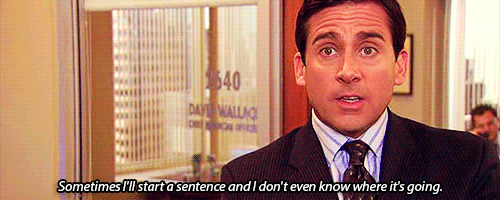5 Research-Backed Communication Mistakes to Stop Making Now

Communication. It’s crucial—but that doesn’t mean it’s easy.
We communicate all day, every day—email, text, talk. But are we doing so effectively? Possibly not.
Effective and successful communication takes a fair amount of thought, consideration, and elbow grease. And there are a few common mistakes that are all too easy to make. In fact, they’re so easy to make that you might not even realize it’s happening.
So, if you’re looking to kick your communication skills up a few notches (and, honestly, who isn’t?), it’s time to start recognizing and avoiding these communication errors—all identified by research and science—that are only undermining your message.
1. You’re Not Listening
Too often, we hear the word “communication”, and think only of the things that we’re saying. However, it’s important to remember that conversations are a two-way street—which means you should plan on listening at least as much as you’re speaking.
But it can’t just be in one ear and out the other: you need to actively listen to what your conversational partner is telling you.
What’s active listening? It’s made up of three key parts:
- Paraphrasing: Summarizing what your conversational partner just said, so that you can ensure you’re both on the same page.
- Inquiry: Asking questions to gather more information and demonstrate that you’re interested.
- Acknowledgement: Recognizing that the other person is speaking through affirmative gestures such as nodding.
It’s pretty simple to do, and actively listening in this way can make a big difference in how you’re perceived as a communicator. Studies show that the more interested you appear, the more likely your conversational partner is to seek you out for further conversations and interactions.
Basically, being a great listener means you’ll be well-liked.
2. You’re Never Changing
Communication isn’t set in stone. It changes and adapts based on your audience, your message, and even the context you’re speaking in.
But, all too often, we fail to adjust our communication—we just keep doing the same thing over and over again, only to wonder why we aren’t getting a different result. If you’ve ever sent three of the same “Just following up!” emails to an unresponsive recipient, you know what we’re talking about.
So recognizing when you need to tweak your communication style is important. Take the UK tax authority, Her Majesty’s Revenue and Customs (HMRC), as an example. They sent a letter that looked like this to delinquent taxpayers for many years:
We are writing to inform you that we have still not received your tax payment of £5,000. It is imperative that you contact us.
The results? Not great. In fact, it cost them tens of millions of pounds each year—because it simply didn’t inspire those delinquent payers to send in their cash.
But then a team of behavioral scientists from the UK government stepped in and drafted a new letter. Their version looked a little something like this:
We are writing to inform you that we have still not received your tax payment of £5,000. By now, 9 out of 10 people in your town have paid their taxes. It is imperative that you contact us.
In response to that letter, the money came rolling in. Well, maybe not rolling in—but, it was a heck of a lot more effective than that first letter, all because of one small addition that matched recipients up against their peers.
Of course, you’re probably not sending letters to delinquent taxpayers, but the point remains the same: recognizing when something isn’t working, and then making the necessary changes to fix it, will yield much better results than continuing to charge ahead with something that obviously isn’t going over well.
So, be willing to tinker with your method of communication, your tone, or even your word choice. You might be surprised!
3. You’re Not Using the Right Medium
We all love email. That’s obvious—after all, the average worker receives around 121 emails each and every day. But as much as you might love being able to conveniently type up your message with all those important details, email isn’t always the best choice for getting your point across.
That’s right—sometimes you need to pick up the phone or even schedule an in-person sit-down in order to ensure you’re making yourself clear.
Not convinced? A poll conducted of 1,000 US workers revealed that 34% of employees think that failing to talk to people on the phone or in person is one of the key issues that prevents their leaders from being truly effective communicators.
Whether you’re in a leadership role or not, consider your message and then give some thought to which medium suits your purposes best. Helpful hint: it may not always be those emails you rely so heavily on.
4. You Don’t Have a Clear A.I.M.
There should always be a purpose behind why you’re communicating. There’s really no point in speaking up if you don’t have a solid reason to do so—unless you’re hoping to emulate The Office’s beloved Michael Scott.

J.D. Schramm, Lecturer in organizational behavior at Stanford Graduate School of Business, says that you need to be clear on your audience, your intent, and your message (which you remember with the mnemonic device A.I.M.) before you open your mouth to speak.
Clarifying your A.I.M. will help you to determine exactly who you’re speaking to, what you’re trying to accomplish, and how you’re going to do so. With that framework in place, you’ll be able to have a clear strategy in your head before ever launching into your message. As with anything, adequate preparation is key for success.
5. You’re Asking Leading Questions
It’s easy to assume that asking questions will make you an excellent communicator. But you need to be asking the right questions.
What does this mean? Well, you’ll want to avoid leading questions—questions where you either answer yourself or point your conversational partner toward a potential answer.
As reported by Shane Snow for TIME, the importance of this point was illustrated in two very different interviews with Elon Musk. In one conversation, the interviewer asked questions like:
What led you into entrepreneurship? Was it something that you always knew that you wanted to be, an entrepreneur on your own? Or did you stumble into it?
The other interviewer kept things much simpler, asking questions similar to:
What are you doing in terms of planetary exploration?
As you might be able to guess, the second interview played out much better—because Musk was given the necessary space to answer questions using his own thoughts. The interviewer’s brief, open-ended questions stayed out of his way and allowed Musk to provide the necessary elaboration.
So resist the temptation to ask long, detailed questions and instead keep things short.
We all want to be effective communicators, but it’s not always easy. Do your best to avoid these five common communication mistakes, and you’re sure to kick your skills up a notch!
What great communication tips have you picked up over your career? Let us know in the comments!